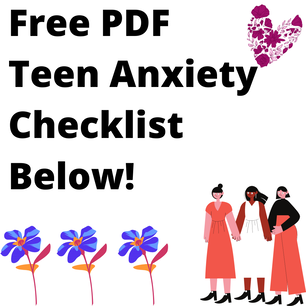 Teenagers will eventually turn into adults. I think this simple statement is often forgotten or ignored. They truly are the future workers, leaders, creators, innovators. And we want them to be WELL because a well them means a well world. My reason for writing this post is to bring to light that many of our teenagers are UN-well. And we see it in the evidence of self-harm, suicides, substance abuse... Our teenagers cannot be ignored. They need healing. Our role as adults, parents, caretakers, teachers, educators, etc. is to guide them. They need us (despite them denying this, because hey, trying to find identity is a tough task). They need us to support them, love them, guide them, teach them. Now, onto one area of healing: Anxiety. Does my teenager have anxiety issues? Anxiety is a big emotion that many teens face; they have so much uncertainty placed before them, trying to figure out their futures while trying to find some sense of belonging. And that's just scratching the surface. Anxiety is a normal emotion that we all have experienced at some point in our lives. It serves to help us "prepare" for something that is to come or alert us of something we are not quite comfortable with (btw, sometimes, I will be talking in universal terms (our, you) because YOUR wellness is vital to you and to your teenager's wellness). Evolutionarily speaking, anxiety served as a way of taking a memory of something bad that happened (even if it was not something that directly happened to us) and making sure it does not happen to us in the future. It is a method of our brains and bodies alerting us of possible future dangers. Now, fast forward to present day... your teen was born into a high-pressure world full of technology that bombards us with the many dangers of the world (and we adults are experiencing it too). And, well, sometimes, anxiety can become a bit too over-enthusiastic about its job and trip into overdrive. The same evolutionary responses happen to our bodies to warn us, but now even nonthreatening things feel dangerous. When our bodies are in this state more than necessary, all the "safety protocols" are exhausted! Thus, we can become physically, mentally, and emotionally exhausted and drained. Our resources become depleted and our functioning is impacted. This is where the "issue" is. All teenagers experience anxiety sometimes. But when it gets to the point it is impacting daily functioning or holding them back from doing what they want to do, we must pay attention. However, even when a teen is still able to function, but feels anxiety more than they would like, we should still help guide them to ways of easing that anxiety so that it does not grow into a problem. Signs of anxiety So how to know if your teen is experiencing anxiety? Anxiety can show up through physical sensations (most easily identified/observed), our thoughts, emotions, and behaviours. Physical signs can include:
If your teen is experiencing any of the above more often than not, and the symptom/s is/are impacting their daily functioning, it might be beneficial to start guiding and teaching them ways to cope and self-soothe. If you are interested in a PDF checklist to see if your teen might be experiencing anxiety, Click Here! You will receive FREE Parent Checklist and FREE Teen Self Report Checklist. This content is for general information purposes only. If you have questions about anything talked about in this article, you should consult your doctor or other professional mental health worker. Nothing herein is intended to or should serve as a substitute for medical advice or diagnoses rendered to you by your individual doctor or other mental health care provider. If you think you or anyone you know are experiencing any mental health issue, you should seek attention from a doctor or other mental health care provider. AuthorSasha Baldeosingh, MSc
0 Comments
Leave a Reply. |
Lifelong Living Counselling Services
|
Sasha Baldeosingh, MSc
Mental Health Therapist |
Sign up for Monthly Newsletter |
Contact |
Quick Links |
© 2024 Lifelong Living Counselling Services. All rights reserved.


 RSS Feed
RSS Feed
